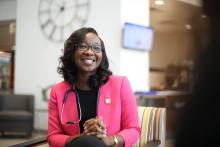User login
Hashtag medicine: #ShareTheMicNowMed highlights Black female physicians on social media
Prominent female physicians are handing over their social media platforms today to black female physicians as part of a campaign called #ShareTheMicNowMed.
The social media event, which will play out on both Twitter and Instagram, is an offshoot of #ShareTheMicNow, held earlier this month. For that event, more than 90 women, including A-list celebrities like Ellen DeGeneres, Julia Roberts, and Senator Elizabeth Warren, swapped accounts with women of color, such as “I’m Still Here” author Austin Channing Brown, Olympic fencer Ibtihaj Muhammad, and #MeToo founder Tarana Burke.
The physician event will feature 10 teams of two, with one physician handing over her account to her black female counterpart for the day. The takeover will allow the black physician to share her thoughts about the successes and challenges she faces as a woman of color in medicine.
“It was such an honor to be contacted by Arghavan Salles, MD, PhD, to participate in an event that has a goal of connecting like-minded women from various backgrounds to share a diverse perspective with a different audience,” Minnesota family medicine physician Jay-Sheree Allen, MD, told Medscape Medical News. “This event is not only incredibly important but timely.”
Only about 5% of all active physicians in 2018 identified as Black or African American, according to a report by the Association of American Medical Colleges. And of those, just over a third are female, the report found.
“I think that as we hear those small numbers we often celebrate the success of those people without looking back and understanding where all of the barriers are that are limiting talented black women from entering medicine at every stage,” another campaign participant, Chicago pediatrician Rebekah Fenton, MD, told Medscape Medical News.
Allen says that, amid continuing worldwide protests over racial injustice, prompted by the death of George Floyd while in Minneapolis police custody last month, the online event is very timely and an important way to advocate for black lives and engage in a productive conversation.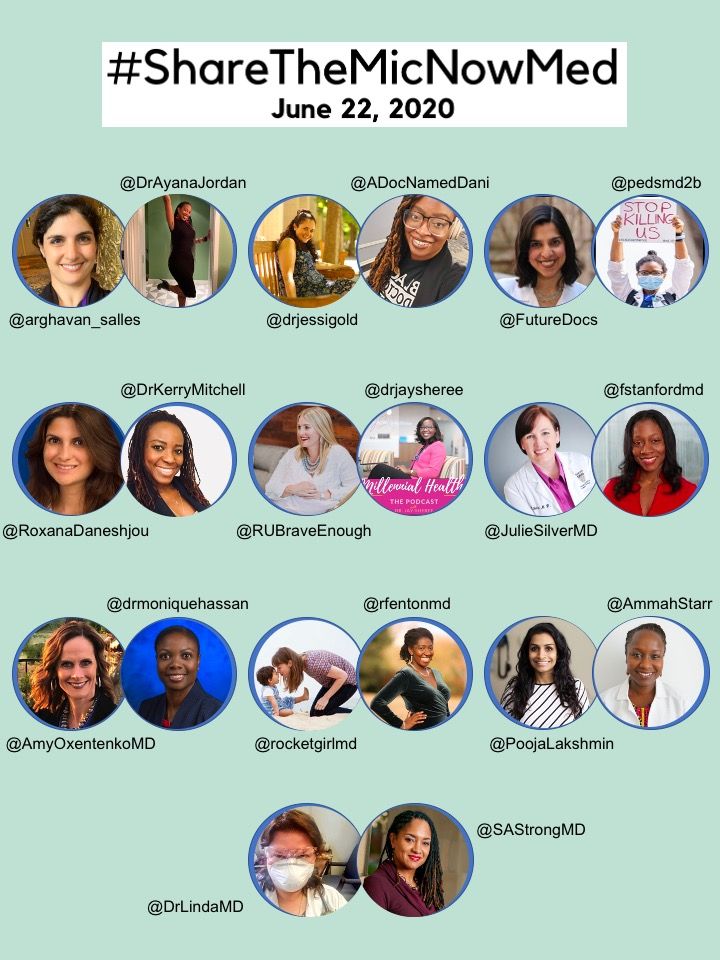
“I believe that with the #ShareTheMicNowMed movement we will start to show people how they can become allies. I always say that a candle loses nothing by lighting another candle, and sharing that stage is one of the many ways you can support the Black Lives Matters movement by amplifying black voices,” she said.
Allen went on to add that women in medicine have many of the same experiences as any other doctor but do face some unique challenges. This is especially true for female physicians of color, she noted.
To join the conversation follow the hashtag #ShareTheMicNowMed all day on Monday, June 22, 2020.
This article originally appeared on Medscape.com.
Prominent female physicians are handing over their social media platforms today to black female physicians as part of a campaign called #ShareTheMicNowMed.
The social media event, which will play out on both Twitter and Instagram, is an offshoot of #ShareTheMicNow, held earlier this month. For that event, more than 90 women, including A-list celebrities like Ellen DeGeneres, Julia Roberts, and Senator Elizabeth Warren, swapped accounts with women of color, such as “I’m Still Here” author Austin Channing Brown, Olympic fencer Ibtihaj Muhammad, and #MeToo founder Tarana Burke.
The physician event will feature 10 teams of two, with one physician handing over her account to her black female counterpart for the day. The takeover will allow the black physician to share her thoughts about the successes and challenges she faces as a woman of color in medicine.
“It was such an honor to be contacted by Arghavan Salles, MD, PhD, to participate in an event that has a goal of connecting like-minded women from various backgrounds to share a diverse perspective with a different audience,” Minnesota family medicine physician Jay-Sheree Allen, MD, told Medscape Medical News. “This event is not only incredibly important but timely.”
Only about 5% of all active physicians in 2018 identified as Black or African American, according to a report by the Association of American Medical Colleges. And of those, just over a third are female, the report found.
“I think that as we hear those small numbers we often celebrate the success of those people without looking back and understanding where all of the barriers are that are limiting talented black women from entering medicine at every stage,” another campaign participant, Chicago pediatrician Rebekah Fenton, MD, told Medscape Medical News.
Allen says that, amid continuing worldwide protests over racial injustice, prompted by the death of George Floyd while in Minneapolis police custody last month, the online event is very timely and an important way to advocate for black lives and engage in a productive conversation.
“I believe that with the #ShareTheMicNowMed movement we will start to show people how they can become allies. I always say that a candle loses nothing by lighting another candle, and sharing that stage is one of the many ways you can support the Black Lives Matters movement by amplifying black voices,” she said.
Allen went on to add that women in medicine have many of the same experiences as any other doctor but do face some unique challenges. This is especially true for female physicians of color, she noted.
To join the conversation follow the hashtag #ShareTheMicNowMed all day on Monday, June 22, 2020.
This article originally appeared on Medscape.com.
Prominent female physicians are handing over their social media platforms today to black female physicians as part of a campaign called #ShareTheMicNowMed.
The social media event, which will play out on both Twitter and Instagram, is an offshoot of #ShareTheMicNow, held earlier this month. For that event, more than 90 women, including A-list celebrities like Ellen DeGeneres, Julia Roberts, and Senator Elizabeth Warren, swapped accounts with women of color, such as “I’m Still Here” author Austin Channing Brown, Olympic fencer Ibtihaj Muhammad, and #MeToo founder Tarana Burke.
The physician event will feature 10 teams of two, with one physician handing over her account to her black female counterpart for the day. The takeover will allow the black physician to share her thoughts about the successes and challenges she faces as a woman of color in medicine.
“It was such an honor to be contacted by Arghavan Salles, MD, PhD, to participate in an event that has a goal of connecting like-minded women from various backgrounds to share a diverse perspective with a different audience,” Minnesota family medicine physician Jay-Sheree Allen, MD, told Medscape Medical News. “This event is not only incredibly important but timely.”
Only about 5% of all active physicians in 2018 identified as Black or African American, according to a report by the Association of American Medical Colleges. And of those, just over a third are female, the report found.
“I think that as we hear those small numbers we often celebrate the success of those people without looking back and understanding where all of the barriers are that are limiting talented black women from entering medicine at every stage,” another campaign participant, Chicago pediatrician Rebekah Fenton, MD, told Medscape Medical News.
Allen says that, amid continuing worldwide protests over racial injustice, prompted by the death of George Floyd while in Minneapolis police custody last month, the online event is very timely and an important way to advocate for black lives and engage in a productive conversation.
“I believe that with the #ShareTheMicNowMed movement we will start to show people how they can become allies. I always say that a candle loses nothing by lighting another candle, and sharing that stage is one of the many ways you can support the Black Lives Matters movement by amplifying black voices,” she said.
Allen went on to add that women in medicine have many of the same experiences as any other doctor but do face some unique challenges. This is especially true for female physicians of color, she noted.
To join the conversation follow the hashtag #ShareTheMicNowMed all day on Monday, June 22, 2020.
This article originally appeared on Medscape.com.
Medical community confronts physician depression, suicide
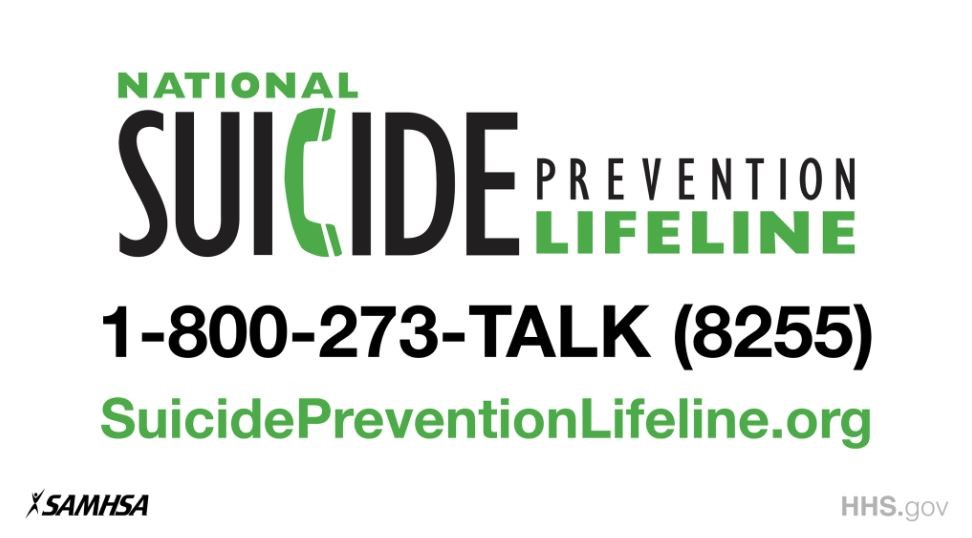
Many physicians work long hours and may ignore the fatigue and emotional toll that comes with those pressures. The stress cannot only lead to crippling depression but also to declined mental health and even thoughts of suicide.
Each year, an estimated 400 physicians take their own lives, mostly because of depression and stress, according to the West Journal of Emergency Medicine.
MDedge Internal Medicine recently hosted a Twitter conversation (#MDedgeChats) on how the health care community can address this emerging crisis and help their colleagues understand that they are not alone. Two primary care physicians — Sarah Candler, MD, and Elisabeth Poorman, MD — led the conversation, with guests Michael Rose, MD, Arghavan Salles, MD, Richard M. Wardrop III, MD, Jessica Gold, MD, and Janae Sharp.
Throughout the conversation, physicians encouraged other medical professionals to seek help if it is needed. “If you don’t feel comfortable sharing with your team, feel free to share with folks you met here,” Dr. Candler wrote. “Please seek professional solace with a therapist! That’s what this is about – the support to do what you need for yourself. Good doctors take care of themselves, too.”
These issues are not just important in the medical community “because everyone will get sick, and we are failing each other. We are failing our patients and our communities when we won’t fight for change. The center will not hold here,” said Dr. Elizabeth Poorman.
The following is an edited version of the discussion.


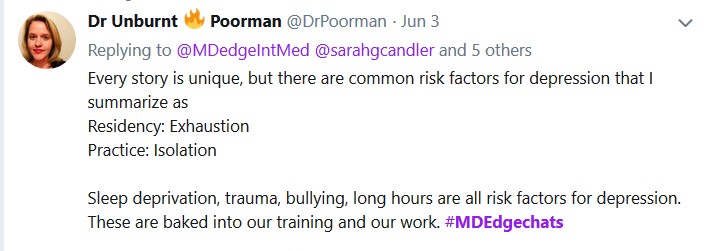



Question 2: "How can we end stigma against seeking mental health treatment among physicians?" is on the next page.






Question 3: "How can we prevent depression and suicide among medical students and physicians" is on the next page.

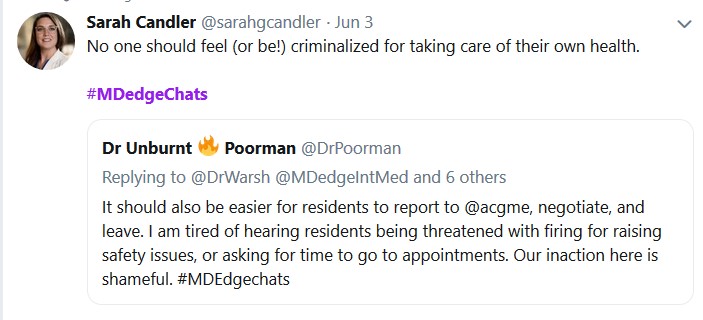
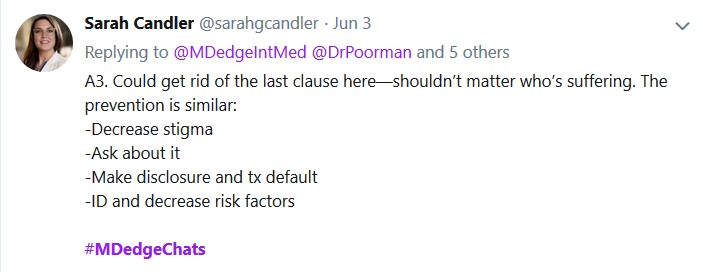

Question 4: "Which institutions or programs are exemplars in providing resources to improve mental health?" is on the next page.




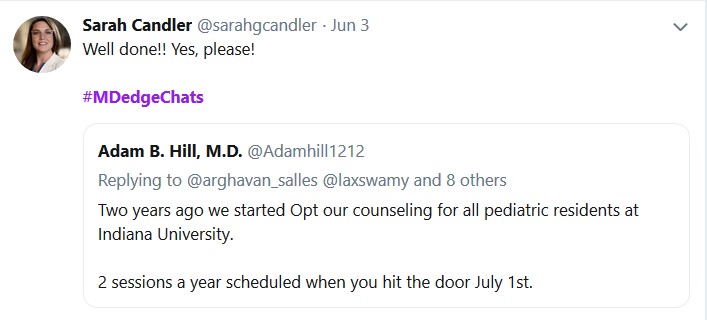



Question 5: "What organizational and political changes are likely to reduce physician suicides?" is on the next page.

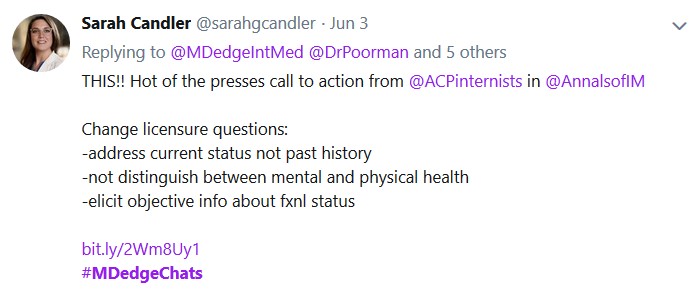




Many physicians work long hours and may ignore the fatigue and emotional toll that comes with those pressures. The stress cannot only lead to crippling depression but also to declined mental health and even thoughts of suicide.
Each year, an estimated 400 physicians take their own lives, mostly because of depression and stress, according to the West Journal of Emergency Medicine.
MDedge Internal Medicine recently hosted a Twitter conversation (#MDedgeChats) on how the health care community can address this emerging crisis and help their colleagues understand that they are not alone. Two primary care physicians — Sarah Candler, MD, and Elisabeth Poorman, MD — led the conversation, with guests Michael Rose, MD, Arghavan Salles, MD, Richard M. Wardrop III, MD, Jessica Gold, MD, and Janae Sharp.
Throughout the conversation, physicians encouraged other medical professionals to seek help if it is needed. “If you don’t feel comfortable sharing with your team, feel free to share with folks you met here,” Dr. Candler wrote. “Please seek professional solace with a therapist! That’s what this is about – the support to do what you need for yourself. Good doctors take care of themselves, too.”
These issues are not just important in the medical community “because everyone will get sick, and we are failing each other. We are failing our patients and our communities when we won’t fight for change. The center will not hold here,” said Dr. Elizabeth Poorman.
The following is an edited version of the discussion.






Question 2: "How can we end stigma against seeking mental health treatment among physicians?" is on the next page.






Question 3: "How can we prevent depression and suicide among medical students and physicians" is on the next page.




Question 4: "Which institutions or programs are exemplars in providing resources to improve mental health?" is on the next page.








Question 5: "What organizational and political changes are likely to reduce physician suicides?" is on the next page.






Many physicians work long hours and may ignore the fatigue and emotional toll that comes with those pressures. The stress cannot only lead to crippling depression but also to declined mental health and even thoughts of suicide.
Each year, an estimated 400 physicians take their own lives, mostly because of depression and stress, according to the West Journal of Emergency Medicine.
MDedge Internal Medicine recently hosted a Twitter conversation (#MDedgeChats) on how the health care community can address this emerging crisis and help their colleagues understand that they are not alone. Two primary care physicians — Sarah Candler, MD, and Elisabeth Poorman, MD — led the conversation, with guests Michael Rose, MD, Arghavan Salles, MD, Richard M. Wardrop III, MD, Jessica Gold, MD, and Janae Sharp.
Throughout the conversation, physicians encouraged other medical professionals to seek help if it is needed. “If you don’t feel comfortable sharing with your team, feel free to share with folks you met here,” Dr. Candler wrote. “Please seek professional solace with a therapist! That’s what this is about – the support to do what you need for yourself. Good doctors take care of themselves, too.”
These issues are not just important in the medical community “because everyone will get sick, and we are failing each other. We are failing our patients and our communities when we won’t fight for change. The center will not hold here,” said Dr. Elizabeth Poorman.
The following is an edited version of the discussion.






Question 2: "How can we end stigma against seeking mental health treatment among physicians?" is on the next page.






Question 3: "How can we prevent depression and suicide among medical students and physicians" is on the next page.




Question 4: "Which institutions or programs are exemplars in providing resources to improve mental health?" is on the next page.








Question 5: "What organizational and political changes are likely to reduce physician suicides?" is on the next page.





